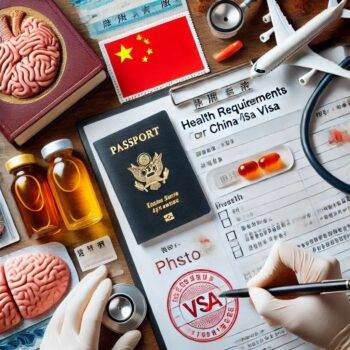
When planning a trip to China—whether for leisure, work, study, or family reunification—understanding the health requirements for visa approval is a critical step.
This guide provides a detailed overview of the medical examination process, specific health requirements for different visa types, and practical tips to ensure a smooth application process.
Additionally, we include links to official resources to help you stay informed and up to date.
Understanding China Visa Types
Before diving into the health requirements, it’s essential to identify the type of visa you need.
Each visa category may have specific health prerequisites, so knowing your visa type will help you prepare accordingly. The primary visa categories include:
- Tourist Visa (L Visa): For short-term leisure travel.
- Business Visa (M Visa): For individuals visiting China for commercial and trade activities.
- Work Visa (Z Visa): For individuals seeking employment in China.
- Student Visa (X Visa): For students pursuing academic studies in China.
- Family Reunion Visa (Q Visa): For family members of Chinese citizens or foreign nationals with permanent residence in China.
- Transit Visa (G Visa): For travelers passing through China en route to another destination.
For more information on visa types and their requirements, visit the official China Visa Application Service Center or contact your local Chinese embassy or consulate.
Medical Examination Requirements
China mandates medical examinations for certain visa applicants, particularly those applying for work (Z Visa) and student (X Visa) visas.
These examinations ensure that applicants are free from infectious diseases and are in good health to reside in China.
Below is a step-by-step guide to the process:
1. Scheduling the Examination
- Contact the Chinese embassy or consulate in your home country to confirm the list of authorized medical institutions. Only examinations conducted at approved clinics or hospitals will be accepted.
- Schedule your examination well in advance of your visa application deadline to allow time for follow-ups if needed.
2. Required Tests and Procedures
The medical examination typically includes the following tests and procedures:
- Physical Examination: A general health check-up.
- Chest X-ray: To screen for tuberculosis and other lung-related conditions.
- Blood Tests: To detect infectious diseases such as HIV/AIDS, syphilis, and hepatitis.
- Urine Test: To check for underlying health issues.
- ECG (Electrocardiogram): To assess heart health.
- Vaccination Records: Proof of vaccinations, including measles, mumps, rubella, polio, and others as required.
For a detailed list of required tests, refer to the official Physical Examination Record for Foreigners.
3. Completing the Health Certificate
After completing the medical examination, the authorized medical institution will issue a health certificate, also known as the “Physical Examination Record for Foreigners.”
Ensure the certificate is filled out accurately, signed, and stamped by the attending physician.
Special Considerations for Certain Health Conditions
If you have a pre-existing medical condition or disability, it’s important to disclose this information during the medical examination.
While certain conditions may not disqualify you from obtaining a visa, transparency is essential to avoid complications.
Below are some specific considerations:
Tuberculosis (TB)
- Applicants with a history of tuberculosis may need to provide additional documentation, such as past medical records and treatment details.
- A positive chest X-ray result will require further evaluation, including sputum tests or a CT scan.
HIV/AIDS
- China’s regulations regarding HIV/AIDS have evolved, and there is no blanket ban on individuals with HIV/AIDS. However, applicants may need to disclose their health status, and decisions are made on a case-by-case basis.
For more information on health-related visa policies, consult the National Immigration Administration of China.
Vaccination Requirements
While vaccination requirements may vary depending on your country of origin, the following vaccinations are commonly required or recommended for entry into China:
- Measles, Mumps, and Rubella (MMR)
- Polio
- Hepatitis A and B
- Typhoid
- Rabies (for travelers visiting rural areas or working with animals)
Check with your healthcare provider or the World Health Organization (WHO) for the latest vaccination recommendations.
Costs and Insurance Coverage
The cost of the medical examination varies depending on the country and the authorized medical institution.
In some cases, health insurance may cover part of the cost. Contact your insurance provider to confirm coverage.
Be prepared to pay out of pocket if necessary, and always request an itemized receipt for reimbursement purposes.
Tips for a Smooth Medical Examination Process
To ensure a hassle-free experience, follow these tips:
- Plan Ahead: Schedule your medical examination early to allow time for additional tests or follow-ups.
- Follow Instructions: Adhere to the guidelines provided by the medical institution, such as fasting before blood tests or bringing required documents (e.g., passport, vaccination records).
- Stay Informed: Health requirements may change over time. Regularly check official sources, such as the Chinese Embassy or consulate websites, for updates.
- Seek Professional Advice: If you have concerns about the medical examination process, consult a healthcare professional or contact the Chinese embassy for guidance.
What to Do If Your Health Certificate Is Rejected
If your health certificate is rejected or you fail to meet the health requirements:
- Request clarification from the Chinese embassy or consulate.
- Provide additional documentation, such as medical records or test results, to address the issue.
- If necessary, undergo further medical evaluations or treatments to meet the requirements.
Conclusion
Meeting the health requirements for China visa approval is a crucial step in the application process.
By understanding the specific medical examinations, tests, and documentation needed, you can ensure a smooth and successful application.
Whether you’re traveling for leisure, business, work, or study, being well-prepared and informed will pave the way for a positive experience in China.
For the latest updates and official guidelines, visit the China Visa Application Service Center or contact your local Chinese embassy.
Safe travels!


